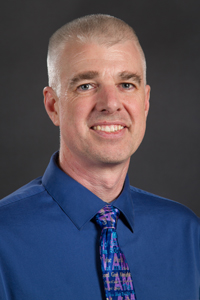Todd Allen, Ph.D.

Biography
Prior to joining Liberty in Fall 2013, Dr. Allen worked in private industry for 15 years on a variety of projects including the development of sensors for chemical warfare agents, integration of sensor networks for homeland security threat detection, and the conversion of algae to biofuels for the Department of Defense. He also helped to develop covert and overt chemical markers and taggants for deterring fraud, counterfeiting, and product diversion.
Dr. Allen joined Liberty in order to use his expertise in chemistry combined with his faith in a way that would impact God’s kingdom and to work in a place where he had the freedom to integrate God’s Word into everyday learning.
Courses Taught
- Chemistry I/II
- CHEM 107 – Essentials of General & Organic Chemistry
- CHEM 121/122 – General Chemistry I/II
- CHEM 135 – Advanced General Chemistry I Lab
- CHEM 136 – Advanced General Chemistry II Lab
- CHEM 321 – Analytical Chemistry
- CHEM 322 – Instrumental Analysis
- CHEM 400 – Chemistry Seminar
- CHEM 495 – Directed Research in Chemistry
- CHEM 497 – Special Topics in Chemistry, “Analytical Aspects of Anticounterfeiting Applications – Fighting Fraud in Pharmaceuticals, Foods, Fuels, and Other Fakes”
- CHEM 497 – Special Topics in Chemistry (Study-Abroad), “Integration of Faith & Science in Israel”
Research Interests
Algae Biofuels
Microalgae can be grown to have a high protein and/or lipid content, which can be used for animal feed, biofuel, or both. Dr. Allen’s students uses GC/MS (Gas Chromatography coupled with Mass Spectrometric Detection) for quantifying the total lipid content in samples obtained from algae biofuels companies who are developing cost-effective ways to optimize growth and harvesting techniques in an effort to convert the lipid fraction of the algae biomass into various types of biofuels.
This work provides students with hands-on, real-world, interdisciplinary training in both chemistry and biology. It will provide them with valuable, transferable skills and knowledge, and prepare them for employment, graduate research, or medical school.
Examples:
- Students will apply fundamental principles of nutrient limitation, stoichiometry, kinetics, and equilibrium learned in their chemistry and biology courses to the preparation and analysis of samples.
- Students will acquire valuable chemistry and biology research experience through literature searches, in sample/standard preparation techniques, in the use of state-of-the-art instrumentation, as well as in data analysis, interpretation, and reporting.
- Students will learn how to effectively summarize and communicate scientific information.
Professional Membership
- American Chemical Society (ACS)
- Council on Undergraduate Research (CUR)
- Virginia Academy of Sciences (VAS)
Patents
Presentations
Publications